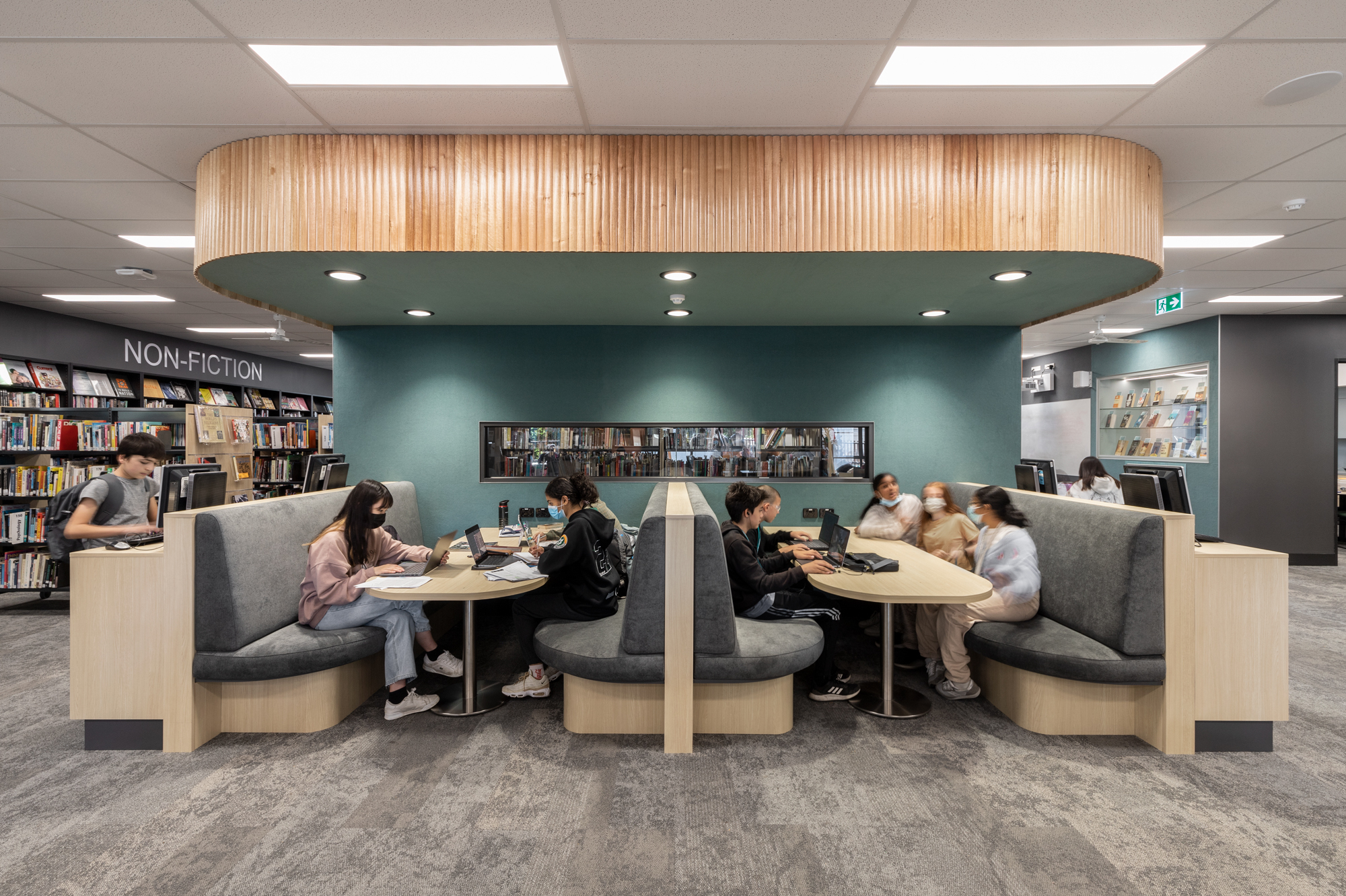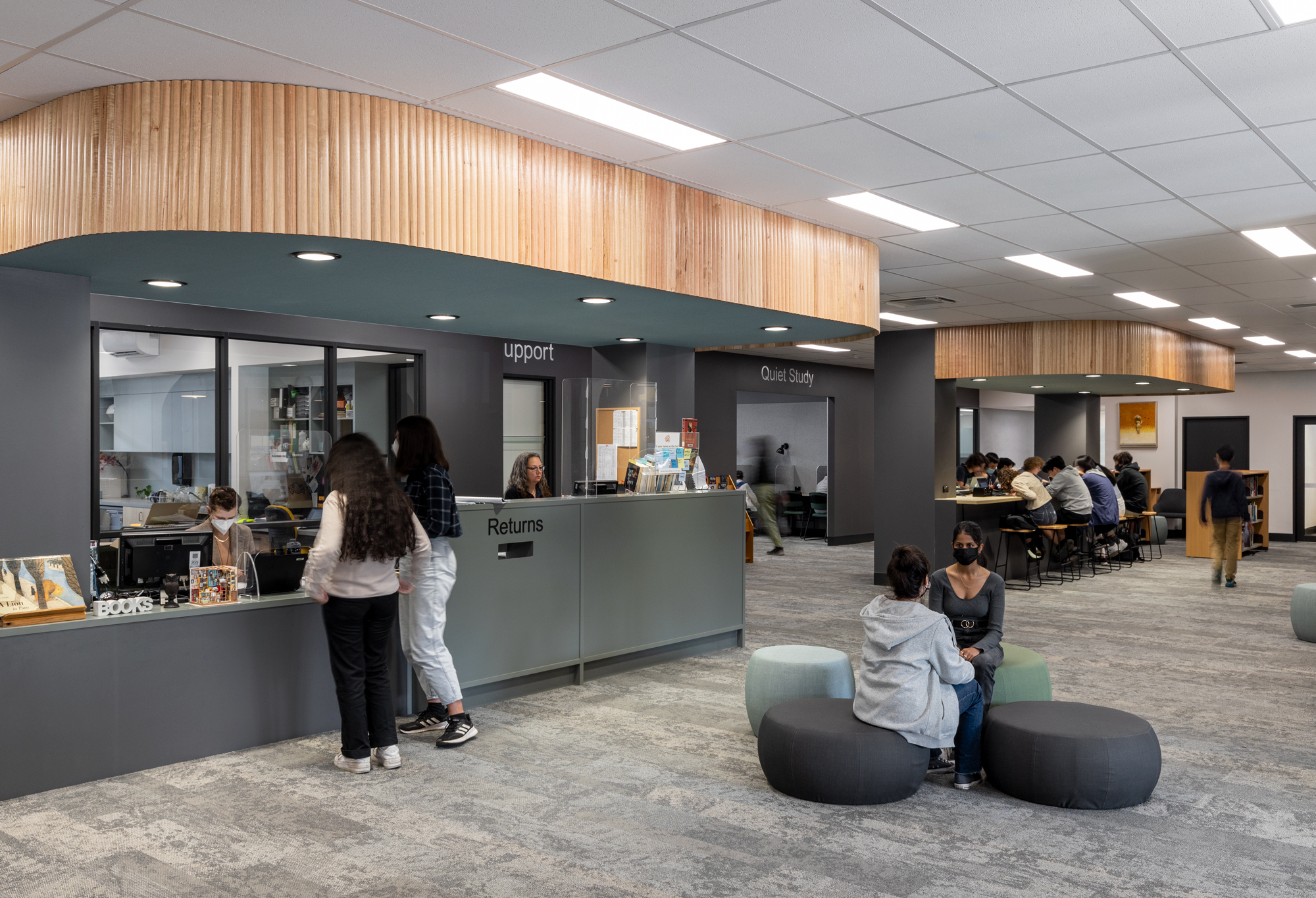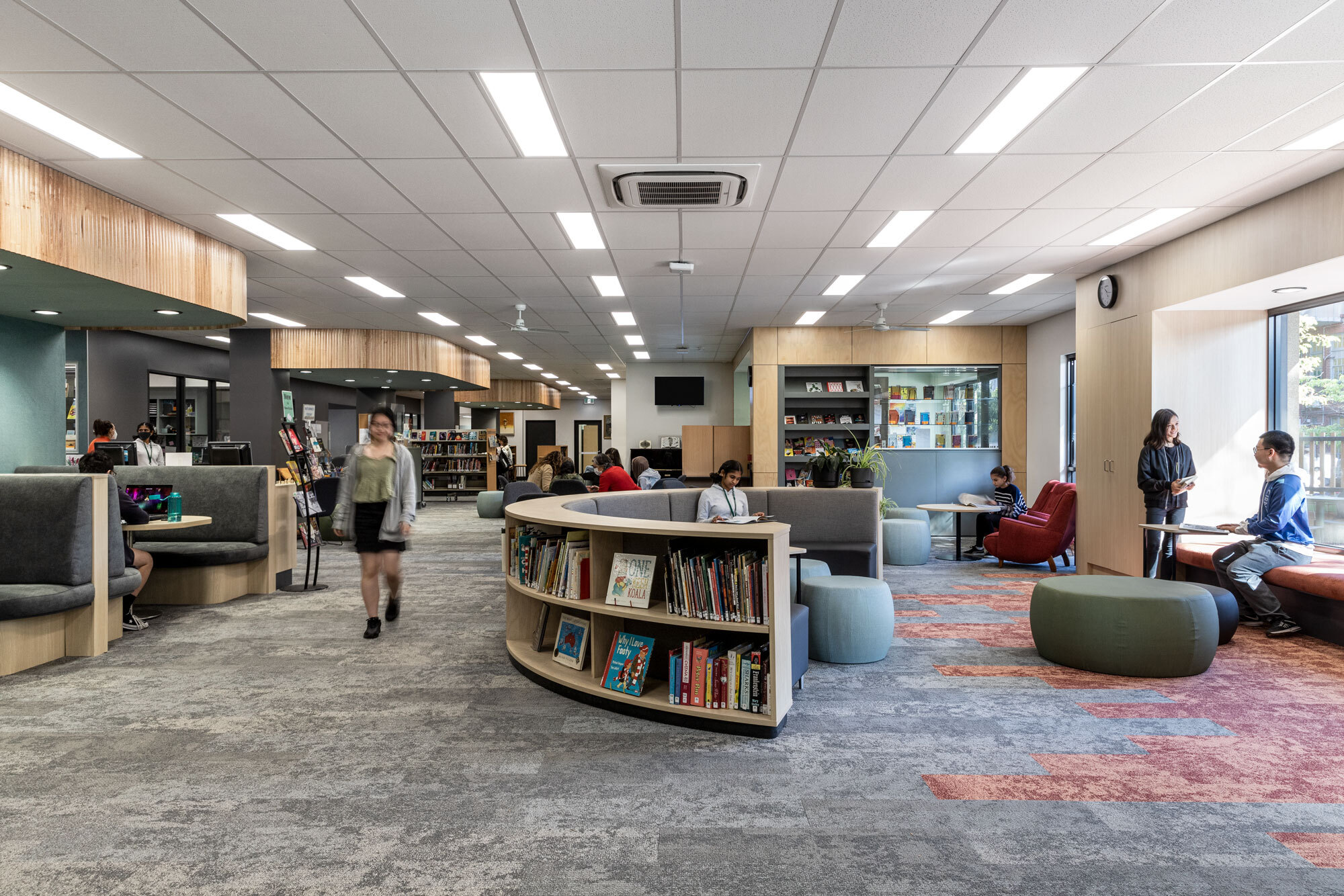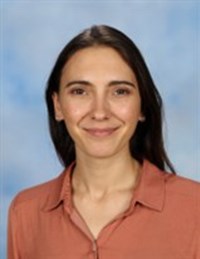Issue 123
Term 4 2022
School library spotlight: University High School, Melbourne
SCIS speaks to teacher librarian Stephanie Ward about her school library in Melbourne's inner North, which has recently been refurbished.

Students working at new study booths in the University High School Library
1. What is your role and what does your job entail?
My job is Head of Library and Research, so most of my work is library management and overseeing the events, programs, services and work of the team. We’re really lucky at Uni High, we’ve got a staff of five; two library technicians and three teacher librarians. We’re not all full time, but it’s nice to have that team to work with and really bounce ideas off one another as it creates a sense of community and growing something and setting goals together which I can appreciate that not all libraries get the opportunity to have.
My role can be more administrative than some of the other teacher librarians on my team. I’m responsible for the budget and ultimately do most of the purchasing but we talk about acquisitions together. I attend a lot of the structured meetings with the school leadership and teaching teams, so my role is around liaising with teacher teams, heads of learning areas and school leadership to advocate for the library, resources the curriculum, and sort of try and stir up encouragement and enthusiasm for working with library staff, running workshops supporting research skills across the curriculum.
2. What would you say is the most rewarding aspect of our work and why?
I taught English for about six years prior to becoming a teacher librarian and the thing that really drew me to the library was that opportunity to see what was going on across the school. So being much more connected to the school as a community, what’s happening in all the different learning areas, getting to witness and participating in the diversity of programs that the school has on offer, all of the activities and events, and what’s going on in the curriculum across
the school.
I like that my job is a lot about having that sort of central, safe, welcoming, supportive space for staff and students, and the role that we have in building a community and responding to the interests and needs of that community. I like that it’s always changing, it’s always evolving, it keeps you on your toes and no day is ever the same.
3. What do you see as the most important part of the library’s role in the school community?
Providing a space that is safe, supportive, and a community space. It’s for students to pursue their passions and it responds to their needs. But it’s also a space for growth and development and something of a haven. I think that’s really important, to have a space like that in a school.
Beyond the space itself, the culture that the library contributes to – it’s really a beacon in the school for the school’s culture and really models the things that we value as a school. Things like celebrating diversity, being inclusive, encouraging creativity and wonder, I think all of those are things the library is in a really good position to be able to foster and model for the school community.
The school library is also integral to teaching, learning, resourcing the curriculum and working with teachers to facilitate access to resources, which is so important, especially given the information landscape and how much that is changing. There are so many facets to finding resources and information. To have somebody who’s in a role to facilitate access to those things and try and bring that information and those resources to people I think is a real-time saver for teachers and an important thing that libraries do.



From top left; study booths, collaborative spaces and the circulation desk at the University High School Library

4. Are there any current issues or challenges facing your library and how are you working to overcome them?
Given COVID, with people at home and students not so much on campus, the sense of community has fallen away a bit. There is more of a disconnection between staff, students and student cohorts and so a lot of the challenges that we face are about how we rebuild those relationships and how we foster the connections back to school.
We are also a growing school. When I first started at Uni High in 2012 we had I think just over 1,200 students, now we’re much closer to 1,800. So that’s just massive growth in quite a short period of time. Having a lot more students has meant employing lots more staff, so there can be a growing sense of alienation, especially due to COVID and the way that people can’t come together and connect as a community. We’re trying to respond to that period of instability and rebuild those relationships with staff as a library team. It’s really important for us to reorient staff into what the library can provide.
5. How do you promote reading and literacy in your school and are there any challenges in doing so?
This is a big one. There are particular programs that we have in our school to really promote reading and literacy. We have a wide reading program for all students from Year 7 to 10. So Year 7 students will come to the library once a week as part of scheduled English sessions for about 50 minutes in the library to browse the collection and choose something that they want to read independently.
Because we have a team of teacher librarians, we’re able to incorporate lots of other activities and things into that time, for example, we often do book presentations. It might be on something that we know they’re learning about in in one of their other classes or in their English class or maybe thematic reading. We might share new books that we just got in or we might have a look at what they’ve been reading previously and then provide comparative reading recommendations. We support teachers to set up literature circles with those classes and get them doing small book clubs.
One of the big things that we have been really trying to focus on this year is scheduled one-on-one reader advisory conversations with students. We’re calling them book chats and those are opportunities for us to get to know the students because we’re really trying to rebuild our relationships with students after lockdowns, just checking in with them about how they feel about reading, to give us a better idea of who we’re seeking to support. That’s something that’s meaningful for them and it’s different from student to student.
As part of the design of the new library space, we included some spaces for things like tutoring or one-to-one small group support and intervention. We have a lot of the literacy specialists working out of these small spaces in the library. Providing that space then means that those specialists are coming down to the library. They’re having more conversations with library staff, which creates more opportunities for us to work together.
6. So how do you promote interest in STEM areas in your school and are there any challenges in doing so?
I think that’s something that we could do more of. There are things that we’re doing, but it’s definitely something that I’ve been thinking about. So what we do at the moment is that we have a pretty good relationship with the Elizabeth Blackburn Science School by supporting the Extended Investigations subject that runs through that school and we do workshops, assist with the oral assessment, and support inquiry learning as part of their ongoing project. We also aim to resource those STEM subjects through our provisioning of digital resources and databases.
There are also things like the student-run coding club/game development club who use one of the library spaces to meet up every week. We try and facilitate that and support them with anything that they might need.
7. How do you encourage students to make use of the library?
We're really lucky to have a beautiful new space. Our library was recently renovated which helps promote the use of the library and its services. There was lots of consultation and feedback from students on the initial designs, and then as the project was evolving about what they would want to see for the new space. So we have these spaces that are purpose-built to respond to the needs and the interests of our students and that’s made a big difference, and we’re now able to host a variety of student clubs and activities as a result.
We have a pretty extensive orientation program for students and our wide reading program really facilitates that for us. It provides opportunities to come into classes and talk to them about who we are, what we do, the programs we run and the services we provide, and then also chat with students one-on-one so that they get to know us personally. Then we also take lots of opportunities as students move up through the years into the senior year levels and their library needs evolve to try and reiterate those services and programs that they might not have been so interested in previously.
8. What’s your favourite thing about SCIS?
Connections is my favourite thing about SCIS. It has been really important for me, it’s helped me see what other school libraries are doing. One of the big projects that we were undertaking when I first started in the library was the genrefication of our fiction collection. I read everything that I could about that process and what the experience was from other school libraries.
Same goes for the design of the new library. To read about library spaces, what they offer the and what the programs are that other schools are doing really informed our designs, and it also was really helpful for me because it informed my discussions and feedback to the architects who were involved in that process.
